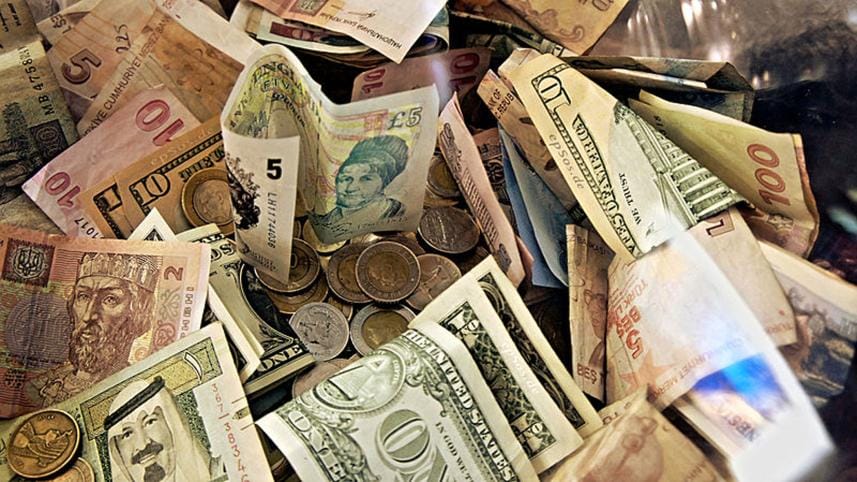Banks move away from multiple exchange rates

Banks in Bangladesh have decided to enforce a uniform exchange rate of the US dollar from next week with a view to moving away from multiple prices of the American greenback blamed for the ongoing foreign currency instability.
The move is part of the central bank's effort to embrace a market-based exchange rate in line with the conditions attached to the International Monetary Fund's $4.5 billion loan.
Yesterday, banks decided to buy the US dollar at Tk 109.50 and sell them at Tk 110 from the first working day of next week.
The Bangladesh Foreign Exchange Dealers Association (BAFEDA) and the Association of Bankers, Bangladesh (ABB) fixed the single exchange rate during a virtual meeting, which was attended by the leaders of the two associations.
Bangladesh Bank Chief Economist Md Habibur Rahman made a presentation at the meeting.
The uniform US dollar rate came at a time when the country's forex reserve continued to decline.
On August 30, the gross international reserves stood at $23.06 billion, according to the Bangladesh Bank, which began publishing foreign currency reserves as per the IMF's manual in July.
The reserves have fallen by about 25 percent in the past one year.
As of yesterday, the exchange rate was at Tk 109 per dollar for remittance, while it was Tk 109.50 for importers and Tk 108.50 for exporters as per a previous decision of the BAFEDA and the ABB.
As per the new decision, the exchange rate was revised upwards to Tk 109.50 per dollar for remitters and export bills and Tk 110 for importers.
The inter-bank exchange rate will be Tk 110 per dollar.
After the meeting, BAFEDA Chairman and Sonali Bank Managing Director Md Afzal Karim told The Daily Star: "This is a market-based exchange rate because we have fixed it after observing the market."
"If banks violate the rate, the central bank will take action against them."
Policy Research Institute Executive Director Ahsan H Mansur declined to accept the new rate as market-based.
He argued: "The dollar rate is Tk 118 in the kerb market and the real exchange rate is close to the kerb market."
A senior official of a private commercial bank who attended the meeting said the meeting also discussed the ongoing volatility in the forex market driven by higher import bills against moderate export and remittance earnings.
He said the uniform rate is close to the real effective exchange rate (REER), which stands at Tk 110.50 to Tk 111 per dollar.
The official said banks were asked to stop imposing multiple rates for remittances, export bills and importers in order to stabilise the foreign exchange market.
The meeting described hundi, a cross-border illegal money transfer system, as a major challenge.
"Banks have been asked to curb hundi."
Before the coronavirus pandemic, hundi cartels accounted for nearly half of remittance transfers to Bangladesh as the segment offered better US dollar rates than banks and other financial service providers.
Migrant workers sent $21.61 billion to Bangladesh in the just-concluded fiscal year.
The central bank is committed to implementing a unified and market-driven single exchange rate considering prevailing market conditions as per the conditions agreed with the IMF.
Introducing a single exchange rate system for exports, imports and remittances will be an automatic stabiliser against any external imbalances, said the BB in June in its monetary policy statement.
Centre for Policy Dialogue Executive Director Fahmida Khatun said the forex market mechanism could not work when the exchange rate is fixed.
"It is not a sustainable solution when the exchange rate is fixed artificially. We badly need a market-based exchange rate."
The economist called the falling trend of the reserve a major concern for the economy.
Fahmida Khatun said that the overdue foreign debt re-payment is another major concern.
PRI's Mansur warns that if the wide gap between the formal and informal exchange rates continues, remittance earnings through the formal sector will continue to fall.
"There will be a shortage of US dollars in the inter-bank market when remittance flow using the informal sector goes up."
The former official of the IMF said the local currency would have to be made attractive by hiking the interest rate.



 For all latest news, follow The Daily Star's Google News channel.
For all latest news, follow The Daily Star's Google News channel.
Comments